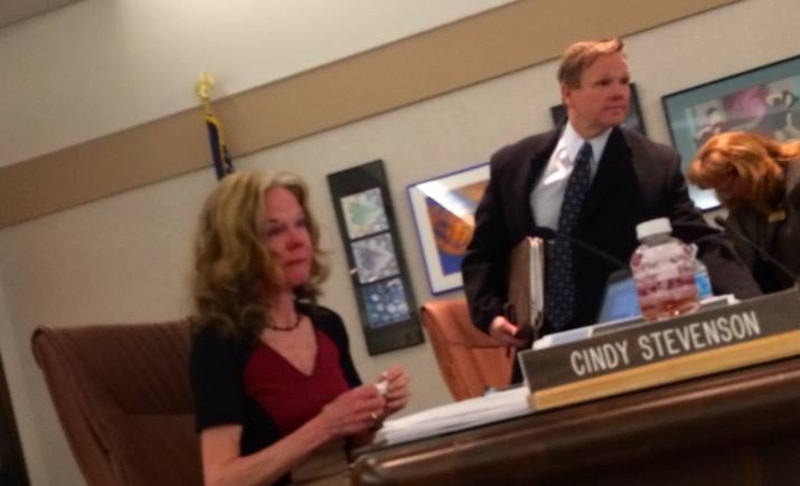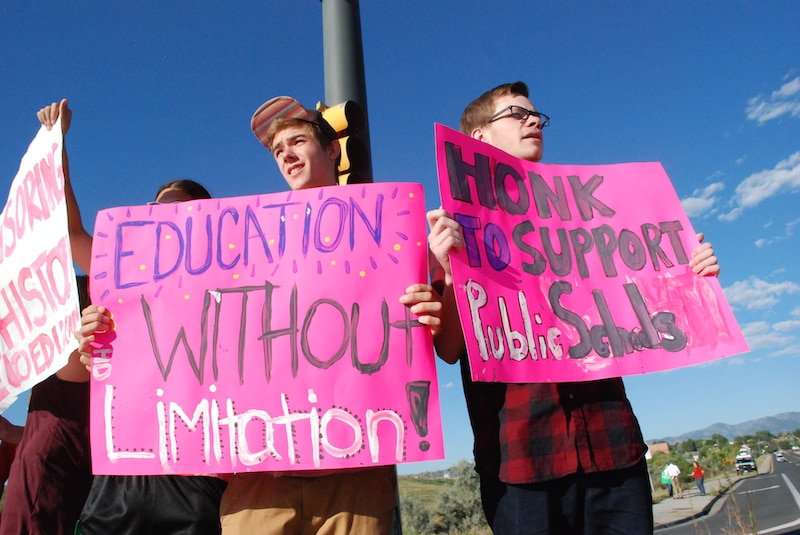LAKEWOOD — After two years of political acrimony in the Colorado’s second largest school district, three conservative school board members were easily swept out of office Tuesday in a recall election that cost more than a million dollars and attracted national attention.
Replacing them are three candidates backed by a constituency of well-connected parents, high-profile county Democrats and the teachers union. They will serve the rest of the recall targets’ four-year terms.
Two other school board candidates supported by organizers of the recall also were elected, completely resetting the Jefferson County school board.
“It appears to me public education in Jefferson County is not for sale,” said school board member-elect Ali Lasell.
The conclusion of the tug-of-war for Jeffco Public Schools not only sets Jeffco Public Schools in a new, if not familiar, direction but also inflicts a high-profile blow to conservative education reform activists who support merit pay for teachers and expanding charter schools and voucher programs.
“Change is hard and sometimes the first agents of change suffer from a slow response,” said ousted school board president Ken Witt.
At odds in the recall were some of the nation’s thorniest education debates: how teachers are evaluated and paid, the role of charter schools and how to fund them, and how to pay for early childhood education.
The recall was a big gamble for the school board’s critics, considering that such efforts are expensive and rarely successful.
Ultimately, recall organizers were able to convince about 28,000 more Jeffco residence to cast a vote in this year’s election than in 2013. Those additional voters overwhelming voted to recall the school board majority in a race many political observers expected to be close.
For example, 82,868 voters in 2013 voted to put Julie Williams in office. In 2015, 104,845 voters voted to recall her, according to returns posted by 10:30 p.m.
Williams declined to comment on the results.
Organizers behind the recall, surprised by the two-to-one margin of victory, credited their vast network of parents, teachers and other civic leaders who volunteered thousands of hours to carry recall petitions, walk neighborhoods, host dinner parties and post relentlessly on social media.
“We might have been outspent by the other side,” said recall organizer Michael Blanton, “but we weren’t outworked.”

Genesis of a controversy
The three school board members recalled Tuesday — Witt, John Newkirk and Julie Williams — were elected by wide margins in 2013.
The three conservatives rode a wave of backlash against a controversial data management program being piloted in Jeffco schools that was backed by tech giant and education reform activist Bill Gates and a billion dollar statewide tax increase also on the ballot.
Further, the three candidates claimed Jeffco schools, which had a generally well-regarded reputation, could and should do better to boost student achievement, which was stagnant.
While critics claim the board majority was elected during a low turnout off-year election, 2013 boasted the highest ever turnout in Jefferson County in an odd election year: 43 percent. Turnout this year was 45 percent.
The day after the 2013 election, Superintendent Cindy Stevenson announced she’d leave her post at the end of the school year after leading the district for 12 years, later citing a breakdown in trust.
Later that spring after a national search, the school board, on a 3-2 vote, named Douglas County schools administrator Dan McMinimee as Jeffco’s new superintendent. His ties to Douglas County, where similar reforms were underway, and his salary would become recall campaign fodder.
Parent network sprung up early
The foundation for the recall effort’s ground game was built on websites and social networks created by a core group of parents that previously had the ear of superintendent Cindy Stevenson.
Soon after the school board majority was elected, parents and activists began videotaping school board meetings and uploaded clips to YouTube. Blogs tracking the school board majority’s every move sprung up. Facebook groups connected parents with civic leaders and teachers.
Once the recall was officially launched in late June, those YouTube filmmakers, bloggers and Facebook friends became ground troops that went door-to-door every weekend to wrangle votes.
“We couldn’t have done the recall without the network we’ve developed with parents groups and civic organizations,” Tina Gurdikan, one of the recall’s parent organizers.
Teacher pay was flagship reform
Perhaps the school board majority’s most contentious move involved how teachers are paid.
In September 2014, the majority approved a plan to link teachers’ raises to their annual evaluations. The plan, which did not include input from the teachers union, was based on a graph Witt drew by hand.
It called for the minimum salary to be raised to $38,000; teachers rated effective to earn a raise and those rated highly-effective to receive even more compensation. Teachers who were rated less than effective would receive no raise, unless their minimum salary was less than $38,000.
Previously, the minimum salary was $31,000 and teachers were given raises based on years of service and their education level.
The school board majority’s relationship with the teachers union only further deteriorated in 2015 when the board majority — as well as the board’s minority members — approved a higher salary scale for teachers who would join the district in 2015.
Jeffco veterans, who voluntarily took pay cuts and pay freezes during the previous five years, felt snubbed.
That vote — along with refusing to allocate $15 million in one-time money for raises — almost derailed contract negotiations with the union.
Ultimately, a new contract was signed and more than $21 million went to pay for teacher raises. But as critics pointed out, that averaged out to about a 1 percent raise per teacher, far less than the increase in cost-of-living.

A contentious history lesson
The nation’s attention first turned to the turmoil in Jefferson County when thousands of high school students began protesting a 2014 proposal to create a new curriculum review committee taking aim at a recently-revised advanced U.S. History class.
Conservatives across the nation had complained that a revised Advanced Placement U.S. History class was too critical about the nation’s history and did not emphasize important political figures like Thomas Jefferson.
Teachers, parents and students saw school board member saw an overreach in Williams’ proposal, which asked for curriculum that promoted American Exceptionalism and discouraged social strife.
After two weeks of student walkouts, national headlines and a trending hashtag — #jeffcoschoolboardhistory — on Twitter, the school board majority passed a dramatically scaled-back resolution that placed parents and students on an existing curriculum review panel. They also made that panel responsible to the school board so those meetings would be public.
It was that debate over the U.S. history course that weighed heavily on Westminster voter Brian Little. He voted for the recall.
“I didn’t like that history thing they did last year,” he said Tuesday, referring to school board member Julie Williams’ proposal.
On the other side of the Advanced Placement U.S. History debate and recall was Don Fitzner. He said he believed the teachers union used students as pawns to drive a wedge in the community.
“The teachers union is out to railroad these guys,” he said. “They want to teach a version of history that blames America for everything that is wrong in the world.”
Big money on both sides flooded campaign
The combined costs for the recall and the campaign for two open seats is expected to swell beyond a million dollars and stands to be the most expensive school board election in state history. Much of that money will never be fully disclosed because of limited disclosure requirements.
The political committees Jeffco United for Action, which launched the recall, and Jeffco United Forward, were financed mostly by small donors throughout Jefferson County, including $13,000 collected by selling yard signs at $10 a pop.
Low-profile Democratic donors with deep pockets and the county’s teachers union also gave liberally to support the slate of candidates backed by recall organizers.
Meanwhile, three social welfare nonprofits came to the defense of the school board majority: Jeffco Students First Action, the Denver-based Independence Institute and Americans For Prosperity, which is backed by the conservative billionaire Koch Brothers.
Because the three organizations are nonprofits, they are free to raise an unlimited amount of money and so long as they don’t directly advocate for candidates, are free to keep their expenditures private.
Healing, but first a little gloating
While the recall effort garnered national attention, the issues and rhetoric were extremely personal.
In one instance, Witt’s youngest daughter was harassed at her high school. In another, a supporter of the board majority suggested members of teachers union should “executed.”
Jabs were exchanged on Twitter and the micro-social networking site Nextdoor. Accusations were flung back and forth on news websites.
All five newly elected school board members Tuesday night pledged to work with all members of the Jeffco Public Schools community , while also reveling in their easy victory.
“We didn’t just win this — we slammed them,” said Ron Mitchell, who will succeed Witt. “What an incredible thing: We the people pushed back against big money, pushed back against an agenda that was not good for our schools.”
School board member-elect Amanda Stevens took a different tone.
“We look forward to reconciliation and paths forward as a united Jeffco,” she told the audience.
Superintendent McMinimee, in a statement said he looked forward to working with the new school board to bridge the divide in the school community.
“We hope that our Jeffco community can heal its rifts and reunite to focus on ensuring that every Jeffco student is well-equipped and prepared to excel in his or her college life or career,” he said.
Chalkbeat reporter Ann Schimke contributed to this report.
This article was updated to include updated voter turnout numbers.

